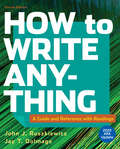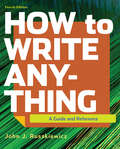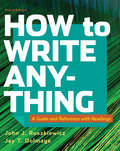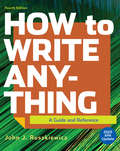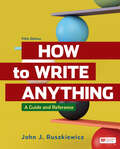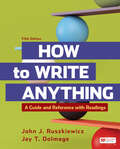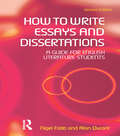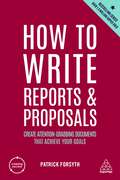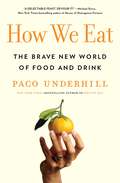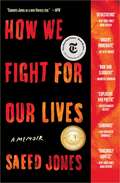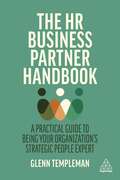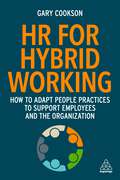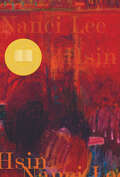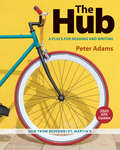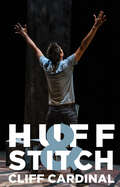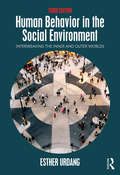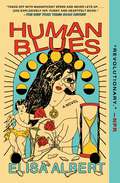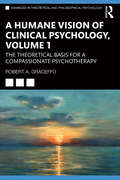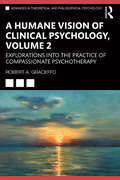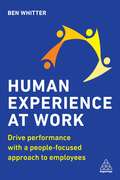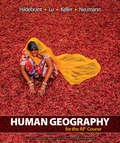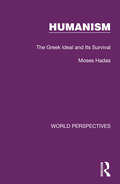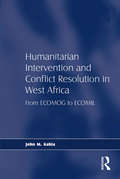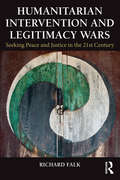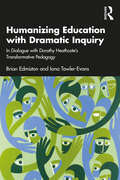Special Collections
Benetech’s Global Certified Accessible Titles
Description: Benetech’s GCA program is the first independent third-party EPUB certification to verify ebook accessibility. By creating content that is born accessible, publishers can meet the needs of all readers. Learn more: https://bornaccessible.benetech.org/
- Table View
- List View
How to Write Anything
by John RuszkiewiczInstructors at hundreds of colleges and universities have turned to How to Write Anything for clear, focused writing advice that gives students just what they need, when they need it. And students love it―because John Ruszkiewicz’s tone makes writing in any genre approachable, with a flexible, rhetorical framework for a range of common academic and real-world genres, and a reference with extra support for writing, research, design, style, and grammar.
How to Write Anything?
by John Ruszkiewicz and Jay DolmageInstructors at hundreds of colleges and universities have turned to How to Write Anything for clear, focused writing advice that gives students just what they need, when they need it. And students love it―because John Ruszkiewicz’s tone makes writing in any genre approachable, with a flexible, rhetorical framework for a range of common academic and real-world genres, and a reference with extra support for writing, research, design, style, and grammar.
How to Write Anything
by John RuszkiewiczHow to Write Anything supports students with practical advice for all kinds of writing. The easy-to-follow rhetorical sequence, generous examples, and accessible tone empower students to write in any genre, both in class and in the workplace.
How to Write Anything with Readings
by John Ruszkiewicz and Jay DolmageHow to Write Anything supports students with practical advice for all kinds of writing. The easy-to-follow rhetorical sequence, generous examples, and accessible tone empower students to write in any genre, both in class and in the workplace.
How to Write Essays and Dissertations
by Alan Durant and Nigel FabbThe first book that literature students should read, this guide reveals the distinct set of skills, conventions and methods of essay and dissertation writing.Taking students through the various stages of writing, from planning to final submission, it offers specific guidelines and a lively, detailed commentary on actual examples of student work at each stage.
How to Write Reports and Proposals
by Patrick ForsythGetting a message across on paper and presenting a proposal in a clear and persuasive form are vital skills for anyone in business. This book provides practical advice on how to impress, convince and persuade.This fully updated 6th edition now features even more practical exercises, useful templates and top tips that will help you to write succinctly and with impact across different media. How to Write Reports and Proposals will give you the tools to put over a good case with style.The Creating Success series of books...Unlock vital skills, power up your performance and get ahead with the bestselling Creating Success series. Written by experts for new and aspiring managers and leaders, this million-selling collection of accessible and empowering guides will get you up to speed in no time. Packed with clever thinking, smart advice and the kind of winning techniques that really get results, you'll make fast progress, quickly reach your goals and create lasting success in your career.
How We Eat
by Paco UnderhillAn &“eye-opening&” (Kirkus Reviews) and timely exploration of how our food—from where it&’s grown to how we buy it—is in the midst of a transformation, showing how this is our chance to do better, for us, for our children, and for our planet, from a global expert on consumer behavior and bestselling author of Why We Buy.Our food system is undergoing a total transformation that impacts how we produce, get, and consume our food. Market researcher and bestselling author Paco Underhill—hailed by the San Francisco Chronicle as &“a Sherlock Holmes for retailers&”—reveals where our eating and drinking lives are heading in his &“delectable&” (Michael Gross, New York Times bestselling author of 740 Park) book, How We Eat. In this upbeat, hopeful, and witty approach, How We Eat reveals the future of food in surprising ways. Go to the heart of New York City where a popular farmer&’s market signifies how the city is getting country-fied, or to cool Brooklyn neighborhoods with rooftop farms. Explore the dreaded supermarket parking lot as the hub of innovation for grocery stores&’ futures, where they can grow their own food and host community events. Learn how marijuana farmers, who have been using artificial light to grow a crop for years, have developed a playbook so mainstream merchants like Walmart and farmers across the world can grow food in an uncertain future. Paco Underhill is the expert behind the most prominent brands, consumer habits, and market trends and the author of multiple highly acclaimed books, including Why We Buy. In How We Eat, he shows how food intersects with every major battle we face today, from political and environmental to economic and racial, and invites you to the market to discover more.
How We Fight for Our Lives
by Saeed JonesFrom award-winning poet Saeed Jones, How We Fight for Our Lives—winner of the Kirkus Prize and the Stonewall Book Award—is a &“moving, bracingly honest memoir&” (The New York Times Book Review) written at the crossroads of sex, race, and power. One of the best books of the year as selected by The New York Times; The Washington Post; NPR; Time; The New Yorker; O, The Oprah Magazine; Harper&’s Bazaar; Elle; BuzzFeed; Goodreads; and many more.&“People don&’t just happen,&” writes Saeed Jones. &“We sacrifice former versions of ourselves. We sacrifice the people who dared to raise us. The &‘I&’ it seems doesn&’t exist until we are able to say, &‘I am no longer yours.&’&” Haunted and haunting, How We Fight for Our Lives is a stunning coming-of-age memoir about a young, black, gay man from the South as he fights to carve out a place for himself, within his family, within his country, within his own hopes, desires, and fears. Through a series of vignettes that chart a course across the American landscape, Jones draws readers into his boyhood and adolescence—into tumultuous relationships with his family, into passing flings with lovers, friends, and strangers. Each piece builds into a larger examination of race and queerness, power and vulnerability, love and grief: a portrait of what we all do for one another—and to one another—as we fight to become ourselves. An award-winning poet, Jones has developed a style that&’s as beautiful as it is powerful—a voice that&’s by turns a river, a blues, and a nightscape set ablaze. How We Fight for Our Lives is a one-of-a-kind memoir and a book that cements Saeed Jones as an essential writer for our time.
The HR Business Partner Handbook
by Glenn TemplemanHow do I balance delivery of the HR strategy with the needs of the business? How can I solve key people issues while also becoming a true strategic HR business partner? This book has the answers.Packed with expert advice, The HR Business Partner Handbook explains how HR Business Partners can be both the go-to people expert needed by employees and the trusted strategic ally needed by the business. This book covers how to develop an authoritative knowledge of HR practice as well as deep understanding of what the organization does and its business goals. It includes guidance on all the people fundamentals needed as well as the importance of empathy, humility and how to demonstrate leadership on moral and ethical issues. It also covers how to adapt advice and activity for different stakeholders.This book explains how to identify the root of an HR issue and not just treat the symptoms and most importantly, how to develop solutions that work for an organization and its people. There is practical guidance on how to develop a strategic mindset, learn what to start doing and what to stop. It also features an assessment of the common pitfalls and intra-profession challenges and how HR business partners should seek to approach them. Written by an HR Business Partner, for HR Business Partners, this is an indispensable guide for everyone wanting to excel in this role and drive improvement in an organization, its leaders and HR. Finally, a 'how-to' guide for HR business partners at every stage of their career!
HR for Hybrid Working
by Gary CooksonMany employees are looking for a mix of remote and office working. How can HR professionals adapt policies and practices to ensure hybrid working is effective for the workforce and the business?HR for Hybrid Working covers everything that people professionals need to succeed in a hybrid working model and manage the transition to this new way of working. It shows why and how contractual documents, policies, pay and reward terms need to change, how to manage changing employee expectations and how to assess and communicate to staff what work can be done partially remotely and manage the impact on company culture. There is also insight on how to adapt learning and development (L&D) and wellbeing activities to ensure they support employee development.Alongside expert guidance on how to assess what technology solutions are right for the business, HR for Hybrid Working explains how to manage inductions and exits from the organization when the location of employees is changeable. Packed full of advice, examples and case studies, this book also provides a dedicated section on the new skills needed by HR professionals as organizational roles, structures and processes change in a hybrid working model.
Hsin
by Nanci LeeNanci Lee’s debut explores 4th Century Su Hui’s palindrome of longing. Hsin arises from an ancient Chinese ethical philosophy, less a set of moral standards than an appeal to tune. Heart-mind and nothingness are fair English translations of Hsin, but their tidiness risks losing some of the sharper, wider sides of absence and appetite. As a historical process, according to Hang Thaddeus T’ui-Chieh, Hsin frustrates, “the psychological fragmentation and compartmentalization of the West.” Born to a Syrian father and a Chinese mother, who gave her up for adoption, Lee explores her origins in a compendium of poem fragments where form embraces the process of its unfolding. These are Koan-like poems, resonant with tones at turns ageless and contemporary; Hsin holds silence in ways that both claim and keep at bay.
The Hub with 2020 APA Update
by Peter AdamsPeter Adams, founder of the Accelerated Learning Program (ALP), introduces The Hub: A Place for Reading and Writing, the first and only hybrid digital and print course materials developed specifically for corequisite and ALP first-year writing courses. The Hub is based on innovative, sound, and widely replicated research into best practices for improving developmental student outcomes. The high-quality instructional materials have been carefully developed and thoroughly class-tested to support students of varying skill levels in first-year composition and corequisite courses. In addition, The Hub offers the unparalleled instructor support that only Peter Adams can provide. This flexible digital resource available through Macmillan Learnings Achieve platform, and accompanied by a print text, provides all of the course materials you need to support every learner in corequisite composition. From planning to implementation, The Hub is THE destination for everything you need for your first-year corequisite composition or ALP course.
Huff & Stitch
by Cliff CardinalIn huff, brothers Wind, Huff, and Charles are trying to cope with their father’s abusive whims and their mother’s recent suicide. In a brutal reality of death and addiction, they huff gas and pull destructive pranks. Preyed upon by Trickster and his own fragile psyche, Wind looks for a way out, one that might lead him into his mother’s shadow. In Stitch, Kylie Grandview is a single mom struggling to make a living as a porn star while dreaming of being on the big screen. She’s painfully aware that she is among the many nameless faces on the Internet, the ones that blip across cyberspace, as her yeast infection, Itchia, reminds her at every turn. But when Kylie is offered the chance at a big break, a series of twisted events lead her down a destructive path, revealing a face no one will forget.
Human Behavior in the Social Environment
by Esther UrdangHuman Behavior in the Social Environment: Interweaving the Inner and Outer Worlds is an essential human behavior textbook for social work students. The third edition emphasizes the biopsychosocial framework within a psychodynamic, developmental and life-course perspective and includes a brand new chapter on the psychosocial complexities of technological advances. Written by an experienced classroom teacher, faculty advisor and clinician, the text approaches development through the life cycle, discussing the challenges, tasks, and problems of each stage. Presenting complex concepts in a clear and understandable way, Human Behavior in the Social Environment: Includes 16 chapters which cover the diverse nature of the circumstances that practicing social workers will be exposed to, including cultural differences, mental health issues, and disability; Analyses several different theories, including psychoanalytic, ego psychology, cognitive-behavioral, and postmodern theories in a manner that enables students to engage critically with the subject matter; Includes case vignettes and material from literary works, biographies and newspapers, intertwined with learning exercises and suggestions for additional readings, forming an engaging and practical volume. Written specifically for social work students undertaking courses and modules on human behavior in the social environment, this book is also a valuable resource for beginning and advanced readers in human services, including nursing, medicine, public health, clinical psychology and counseling.
Human Blues
by Elisa AlbertFrom an author whose writing has been praised as &“blistering&” (The New Yorker), &“virtuosic&” (The Washington Post), and &“brilliant&” (The New York Times) comes a provocative and entertaining novel about a woman who desperately wants a child but struggles to accept the use of assisted reproductive technology—a hilarious and ferocious send-up of feminism, fame, art, commerce, and autonomy.On the eve of her fourth album, singer-songwriter Aviva Rosner is plagued by infertility. The twist: as much as Aviva wants a child, she is wary of technological conception, and has poured her ambivalence into her music. As the album makes its way in the world, the shock of the response from fans and critics is at first exciting—and then invasive and strange. Aviva never wanted to be famous, or did she? Meanwhile, her evolving obsession with another iconic musician, gone too soon, might just help her make sense of things. Told over the course of nine menstrual cycles, Human Blues is a bold, brainy, darkly funny, utterly original interrogation of our cultural obsession with childbearing. It&’s also the story of one fearless woman at the crossroads, ruthlessly questioning what she wants and what she&’s willing—or not willing—to do to get it.
A Humane Vision of Clinical Psychology, Volume 1
by Robert A. GraceffoThe primary purpose of psychotherapy is to improve a patient’s subjective experience. A Humane Vision of Clinical Psychology, Volume I shows readers what this might really mean, how it can be achieved, and where prevailing views go wrong in achieving it. It lays out an alternative idea of human suffering and human healing, one that deemphasizes constructs and prioritizes experience itself. Early chapters argue that helping people to "know new things" is the ultimate target of psychotherapeutic change, but that our field has not sufficiently reflected on the complications of this task. A theory is then offered, which suggests that the unthinkable aspects of human experience are responsible for the very ways in which we human beings think. It invites and outlines a serious reformulation of psychotherapy in which human cognition is not the seat but the beneficiary of human change. This book will be valuable for therapists, psychologists, psychiatrists, and other practitioners as well as graduate and undergraduate students in the fields of psychiatry, psychology, psychotherapy, mental health, social work, and philosophy. It will be of great interest for clinicians who find themselves disenchanted with the field’s current ethos, which is stilted by scientistic approaches to soothing the suffering of the other.
A Humane Vision of Clinical Psychology, Volume 2
by Robert A. GraceffoThe purpose of A Humane Vision of Clinical Psychology, Volume II, is to encourage clinical and personal reflection on the part of reading clinicians, so as to foster more thought about the meaning and complexities of the therapeutic encounter. It does so by offering three clinical examples and a searching discussion of what each might teach us about the case at hand, ourselves, and the world. The book begins with an honest exploration of the limitations accompanying any and every attempt to write about the action of psychotherapy, which the first volume characterised as ineffable. More particularly, it is suggested that the deepest therapeutic phenomenon, experiential "proximity," is itself neither fully observable to the participants nor capturable by a verbal account. These concessions, which effectively confine the therapeutic "mechanism" to the air of every encounter, threaten to make descriptions of psychotherapy useless. However, while we can never rightly describe the fundamental cause of change, we can describe its observable corollaries. It is then suggested that certain therapeutic postures—those of kindness, openness, and sameness—facilitate the expansion of the other’s cognitive apparatus and thereby the "knowns" that inhabit their minds (the main goal of therapy, per Volume I). A Humane Vision of Clinical Psychology, Volume II, is valuable for therapists, psychologists, psychiatrists, and other practitioners as well as graduate and undergraduate students in the fields of psychiatry, psychology, psychotherapy, mental health, social work, and philosophy.
Human Experience at Work
by Ben WhitterThe only way for HR professionals to ensure sustainable top performance from their workforce is by taking a people-focused approach to their employees. To outperform their competitors, businesses need happy, engaged and committed employees performing to their full potential. Investing in new technologies or embracing people analytics won't achieve this but a people-focused approach will. It not only improves staff engagement, productivity and wellbeing but also secures the benefits for the business with Deloitte reporting in 2019 that 'organizations focusing on human experience are twice as likely to outperform their peers in revenue growth over a three-year period.' Human Experience at Work is a practical guide for HR professionals and those responsible for talent management which provides advice, examples and guidance on how to embed people-centred approach to staff development. Human Experience at Work covers what human experience is, the benefits for the organization, the benefits for employees, how to make it part of a talent management and organizational development strategy and how to leverage it. There is also coverage of how focusing on people and allowing them to be themselves at work creates a more diverse and inclusive work environment. Supported by case studies, insights, and examples from companies including GSK, Ford, IKEA, Fotile, Grenade, Huel, and Moneypenny.
Human Geography for the AP® Course
by Max Lu and Barbara Hildebrant and Kenneth Keller and Roderick NeumannStudy, practice, rest. Repeat.Human Geography for the AP® Course by Hildebrant et al, is perfectly aligned to College Board’s APHG® course. It includes all course concepts with plentiful skills support and practice. A complete AP® Practice Exam rounds out the tools in this engaging book program.
Humanism
by Moses HadasOriginally published in the UK in 1961 this was an unconventional book when first published but a powerful interpretation of Greek individualism. The author examines the influence of the Greeks on European philosophy, religion, literature, art and architecture and challenges many commonly held assumptions: ‘Those items in the Greek legacy which are most easily recognizable as such are in fact the least important.’
Humanitarian Intervention and Conflict Resolution in West Africa
by John M. KabiaThe end of the Cold War has been characterized by a wave of violent civil wars that have produced unprecedented humanitarian catastrophe and suffering. Although mostly intra-state, these conflicts have spread across borders and threatened international peace and security. One of the worst affected regions is West Africa which has been home to some of Africa's most brutal and intractable conflicts for more than a decade. This volume locates the peacekeeping operations of the Economic Community of West African States (ECOWAS) within an expanded post-Cold War conceptualization of humanitarian intervention. It examines the organization's capacity to protect civilians at risk in civil conflicts and to facilitate the processes of peacemaking and post-war peace-building. Taking the empirical case of ECOWAS, the book looks at the challenges posed by complex political emergencies (CPEs) to humanitarian intervention and traces the evolution of ECOWAS from an economic integration project to a security organization, examining the challenges inherent in such a transition.
Humanitarian Intervention and Legitimacy Wars
by Richard FalkIn the aftermath of the Cold War there has been a dramatic shift in thinking about the maintenance of peace and security on a global level. This shift is away from a preoccupation with how to prevent major wars between sovereign states to a preoccupation about non-state transnational warfare and violence and strife within states in a world order that continues to be juridically and politically delimited by spatial ideas of national sovereignty and national independence as signified by international boundaries. In this book, Richard Falk draws upon these changes to examine the ethics and politics of humanitarian intervention in the 21st Century. As well as analysing the theoretical and conceptual basis of the responsibility to protect, the book also contains a number of case studies looking at Iraq, Afghanistan, Kosovo and Syria. The final section explores when humanitarian intervention can succeed and the changing nature of international political legitimacy in countries such as India, Tibet, South Africa and Palestine. This book will be of interest to students of International Relations theory, Peace Studies and Global Politics.
Humanizing Education with Dramatic Inquiry
by Brian Edmiston and Iona Towler-EvansHumanizing Education with Dramatic Inquiry provides a comprehensive rationale for why and how dramatic inquiry can be used by any teacher to humanize classroom communities and the subject areas being explored with students. Written by teacher educators Brian Edmiston and Iona Towler-Evans, the book re-evaluates the radical humanizing dramatic enquiry pedagogy of British educator Dorothy Heathcote, as developed by the authors in their own teaching using her three approaches: Process Drama, Mantle of the Expert, and the Commission Model. Through scholarly yet practical analysis of extended examples drawn from their own classroom teaching, the volume demonstrates how teachers can collaborate with students of all ages, dispositions, presumed abilities, and cultural backgrounds to transform classroom life into a richly humanizing, curious, inquiring, imaginative community. This book will appeal to educators and teacher educators not only those open to using drama pedagogies in classrooms and in therapy but also to those engaged in applied theatre. Additionally, it will interest those in literacy and education in general who are committed to inclusive, critical, antiracist, anti-oppressive, and artistic practices.
